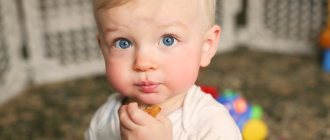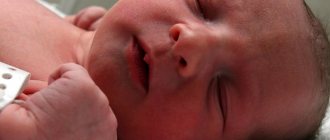Features of babies' sleep
A newborn's sleep protects his psyche from many unfamiliar sounds, sensations in the form of tactile contacts, and smells. The baby has to get used to everything. The duration of rest for each child is individual, but on average it is 22 hours a day. Infants sleep for 5-6 hours, waking up during feeding . Periods of wakefulness are short. They do not exceed 40-50 minutes. During this time, the mother manages to feed the baby and carry out hygiene procedures.
The first 1.5 months for newborns there is no concept of day and night. Parents formulate this concept. Over time, the duration of daytime sleep decreases:
- at 4 months the baby sleeps 3 to 4 times during the day;
- at 6 months up to 3 times;
- in 1.5 years only 1 time.
Why does a newborn baby moan in his sleep?
Features of children's sleep
If you notice that your baby is moaning, grimacing or whining while continuing to sleep, do not sound the alarm ahead of time. The fact is that infant sleep is significantly different from adult sleep. In the first months of life, infants mostly doze; most of their dreams consist of superficial phases. Therefore, newborns often wake up at night, and when they sleep, they are on the move for a long time. The eyes dart under the eyelids, the baby smiles, then begins to cry, moans quietly, throws up his arms and legs. This happens because his brain works several times more actively than that of an adult. Babies may also moan at night as they transition from light to deep sleep.
Colic is the cause of night restlessness. Often infants moan during sleep not only because of the development of their nervous system, but also of the gastrointestinal tract. Already from the second week of life, the baby may begin to experience colic. This is not a disease, but a normal condition of a newborn baby. If his stomach is swollen, after evening feedings the child begins to cry loudly, draws his legs in, clenches his fists, turns red or pale from exertion, and has intestinal spasms. To alleviate the baby’s condition, after each meal you need to carry him in your arms in a column, massage (move your palm clockwise around the navel, pressing lightly) and regularly place the baby on his tummy.
Natural anti-colic drops “Koli Crocodile” will give your baby a restful sleep. They not only reduce attacks of spasms and eliminate gas formation, but also have a beneficial effect on the nervous system of the newborn.
First teeth When your baby is six months old, his teeth will begin to cut. Often this process is accompanied by high fever, profuse salivation and discomfort. Because of this, the baby may moan in his sleep. Give your baby a teether or start using special cooling gels (the pediatric dentist should prescribe the ointment).
Secrets of a restful sleep
To help your baby sleep better, go for walks with him in the evenings. Before going to bed, bathe your baby in a bath with chamomile infusion. An hour before going to bed, stop active games and begin to gradually calm the baby down. After evening feeding, rock the baby a little in your arms and put him in the crib. At the same time, there should be silence in the apartment (calm conversations and muffled music will not disturb the baby). It is better to turn off the lights in the room or leave a night light. It's good if the crib is in your bedroom. Feeling the closeness of the parents, the baby will sleep soundly and peacefully.
Important! Night moans in babies under six months are considered normal. However, if they are accompanied by capricious or lethargic behavior during the day, partial or complete refusal to eat, weak muscle tone, we can talk about disturbances in the functioning of the child’s body. Be sure to show your child to a pediatrician and neurologist.
Sleep phases in infants
The infant's rest period is an alternation of phases: deep (orthodox) and fast (paradoxical). Most of an infant's resting state is REM sleep. This explains that infants sleep very lightly.
During the fast phase, they react to events happening around them during this period of time. The baby’s emotions indicate that peace is superficial:
- laughter;
- cry;
- smiles;
- grunting;
- movements of arms and legs.
By these manifestations one can judge the condition of the baby (physical, psychological). Laughter is a sign of positive emotions, crying and groaning are signs of problems. There may be deviations in the functioning of the gastrointestinal tract if the baby cries in his sleep. Groaning is a common sign of helminthic infestation.
The paradoxical phase promotes brain development. Thanks to dreams, the child rethinks and consolidates new information. The Orthodox phase consists of 4 stages: dozing, falling asleep, deep and very deep sleep. It lasts about half an hour, but during this time the baby’s strength is restored.
| Age (month) | % fast phase |
| 0 to 1 | From 70 to 75 |
| From 2 to 3 | From 45 to 50 |
| From 3 to 5 | From 37 to 40 |
| From 6 to 12 | From 35 to 40 |
Other strange behavior in sleep
Not all oddities are absolutely safe; the appearance of some should alert both parents and the attending physician.
A smile turns into a cry and vice versa
Babies are born with an unformed nervous system. They are unable to control their movements and muscle contractions. After an active day, the child’s sleep behavior changes as the phases change. But the symptom when the peace on the face turns into crying is a signal for parents. The reason may be the formation of gases in the intestines, which causes colic, since the digestive system is in working order.
If this phenomenon occurs frequently, it is necessary to consult a pediatrician to rule out pathologies in the baby’s development.
Attention! Laughter in a dream, according to pediatricians, can be a mild form of an epileptoid seizure. The doctor must rule out the presence of a benign brain tumor (hamartoma) in the baby.
Wincing and grunting
Frequent shuddering of a baby while falling asleep or resting can be harmless. But sometimes this is an alarming symptom that should not be ignored.
Causes of convulsive shuddering and groaning:
- hyperactivity and strong emotions during the day;
- active physical games before bedtime;
- colic and bloating;
- air in the stomach and esophagus;
- increased body temperature;
- loud extraneous noises.
At this age, children make spontaneous movements that they are not able to control: they spread their fingers and toes, wave their arms, make grimaces and stick out their tongues. Some of them are done unconsciously during rest. They are provoked by the work of the subcortical parts of the brain in the active phase of sleep.
Different theories about newborn smiles
The first smiles of a baby make the mother's heart skip a beat with bliss. They look more like slight grimaces. In the first days of life, a smile is a reflex response of muscles to external stimuli. It can be caused equally by both a draft and a feeling of satiety.
A baby's smile in the first days after birth is called endogenous. It most often appears during the rest period, when the baby is at rest. As he grows up, the endogenous smile transforms into an absent-minded one. It appears on the face of a waking baby when he sees the face of his mother and father.
Selective smiles bloom on babies' faces from 6-8 weeks. They appear consciously, serve as a reaction to affection and attention from mom, dad, and grandmother. Over time, the child begins to understand that his smile allows him to receive an additional portion of affection and actively takes advantage of this.
Doctors' explanation about babies smiling in their sleep
Parents can admire how little children sleep forever. However, when they see that the baby is smiling in his sleep, mothers and fathers begin to think about the reasons for this phenomenon. This comes as a surprise to many, since there is a widespread belief that infants cannot dream of anything and, accordingly, evoke positive emotions.
In fact, a real dream can make a newborn smile, but not only that.
Dreams
Scientists have long proven that children dream. Naturally, the main character for a child in his dreams is his mother. When a newborn smiles in a dream, we can assume that he sees his mother’s face, hears her voice, the beat of her heart, feels the warmth of her chest, or even smells his native smell. It is this object that evokes the most joyful emotions in the baby and is associated with food, coziness and comfort.
Over time, the baby's dreams will become more diverse due to the fact that every day he will learn more and more about the world around him. In this way, the number of dream objects will gradually increase. All this will undoubtedly be reflected on his face when he sleeps.
There is also an opinion in the scientific community that during sleep, a baby gains access to information stored in genes. Researchers suggest that in their dreams, babies are able to reproduce images from the lives of their ancestors. This gene memory actively stimulates the development of feelings and thinking.
Other reasons
The reason why children smile in their sleep may be completely natural physiological processes. Thus, pediatricians believe that a baby’s smile only means a grimace. The facial muscles of a newborn can spontaneously tense and relax, which causes some semblance of a smile.
In addition, every day is rich in new impressions and discoveries for a newborn. These circumstances affect the mental state of the baby, increasing its excitability and activity. Such an emotional background will, without a doubt, be reflected in the behavior of the sleeping child and his facial expressions. In order to reduce the likelihood of such manifestations, it is recommended to somewhat limit the amount of entertainment and new experiences in the life of a new person.
The fact that the baby laughs in his sleep may indicate that there has been a change in sleep phases - from slow to fast. In addition to laughter, other manifestations may be observed: muttering, grunting, erratic movements of the limbs, etc.
Creating favorable conditions for sleep
Comfortable conditions for rest allow you to see a smile on the lips of a sleeping baby more often. To create them, parents will have to make some efforts:
- Gradually accustom the baby to the regime. After birth, newborns have no concept of day and night. Parents should help their child develop time orientation. During the day, they need to forcibly alternate periods of rest and wakefulness, and at night create comfortable conditions for a long period of rest.
- The mother should limit the baby’s activity so that he quickly immerses himself in the realm of dreams.
- By putting the baby to bed at a certain time, parents adjust the child's biological clock, which helps him fall asleep quickly.
- The quality and duration of the state of rest is influenced by the microclimate in the room. Optimal air temperature is from 20 to 23 °C, humidity is not less than 55%.
When does a baby start to smile “for real”?
In order for your baby to give you his first conscious smile, he must go through several important stages in his development.
A child is born with imperfect vision. He sees large, large objects well at a distance of 20-30 cm. The child sees his mother’s face slightly blurred. Normal vision develops around the age of one month; it is then that the child begins to distinguish the facial expressions of adults and tries to “copy” it.
A huge amount of work is done by the baby’s nervous system, his psyche. After all, you need to understand that the appearance of a face in the field of vision is associated with the pleasant feelings that it experiences, and remember how you can express your pleasure.
To smile, you need to use 17 muscles. Imagine the work your child does!
Typically, babies begin to smile consciously between 6 and 8 weeks of age. The neurological norm is more vague - from 5 to 12 weeks.
This new smile is easy to distinguish from a reflex smile, since it is intended for a specific person. When a newborn begins to smile consciously, it cannot be ignored.
Experts' opinion
Doctors have different views on the laughter and smiles of babies during night and daytime rest. Some consider this to be the norm, others do not exclude the possibility of pathologies.
Doctor Komarovsky
A popular doctor believes that a sleeping baby's smile is normal. It only indicates the positive emotions that the child experiences.
Frequent laughter during rest, in his opinion, indicates that the child does not have a daily routine.
Dr. Komarovsky cites stress caused by certain circumstances as the reasons for children's laughter during sleep:
- frequent changes of environment;
- communicating with strangers;
- visiting places with large crowds of people.
Watching cartoons before bed can also cause a child to become emotional.
TV presenter Malysheva
Elena Malysheva suggests examining a child if he laughs during the rest period. In her opinion, a strong manifestation of emotions can be an epileptoid seizure. Her TV show gives examples where frequent laughter was caused by a hamartoma, a benign tumor in the brain.
An undoubted cause for concern is laughter, which is accompanied by other unpleasant manifestations, these include:
- eye rolling;
- muscle cramps;
- lack of activity during waking hours;
- absolute lack of interest in the surrounding reality.
To identify the problem, the baby is examined and an MRI of the brain is done. The diagnostic result excludes or confirms the presence of pathology.
Theories about childhood dreams
Let's take a closer look at what dreams babies have. Why do small children smile and laugh in their sleep?
- The first, completely dry and pragmatic version is that children do not smile at all in their sleep. Nerve impulses generated in the brain during REM sleep cause involuntary muscle contractions. This includes the reaction of the facial muscles. They cause grimaces that look like smiles.
- There is another theory. When children sleep, they process information received from ancestors with genes. At this time, the nervous system matures, and the brain receives a charge of “primary” knowledge about the structure of the world.
- Somnologists are confident that babies do dream. And they are continuously associated with active brain development. The more active his work, the brighter the sensations. The relationship is also strong in the opposite direction - dreams increase the activity of the central nervous system. Since the main source of sensations for a newborn is the mother, dreams are also associated with her. Newborns' vision is imperfect, so they don't see as clear pictures as adults. But they perfectly capture the smell, voice, feel affectionate touches and taste of breast milk. The mother also gives the baby a feeling of security and peace. It is these pleasant emotions that are reproduced when children sleep.
If the mother is calm, there is no reason to worry; she conveys her confidence to the baby. In such cases, observing a sleeping child smiling is not at all uncommon. The picture is completely different if the mother is tired, worried or irritated about something. The child reads this mood, and the brain reproduces negative emotions. Such children often wake up, cry, and behave restlessly.
Some argue that newborns most often dream of their mother's breasts. Therefore, many do not give children bottles and pacifiers, thinking that the baby will see a piece of polymer in a dream.










